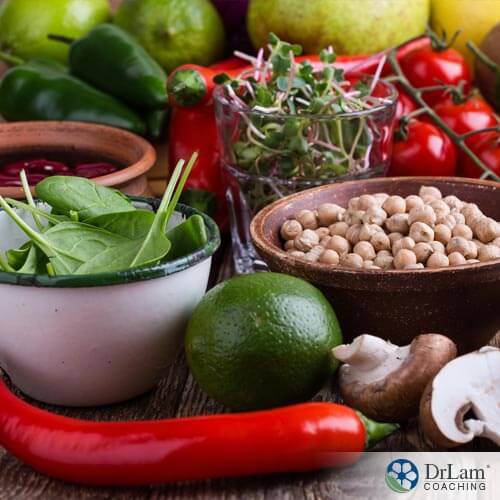 With all the research indicating how important a healthy lifestyle is for optimal wellness, many people are turning to healthier living habits that include better diets, more exercise, and less stress. But what does the term “better diet” actually mean? There seem to be so many varieties of diets available, choosing the best one for you and your family is often a difficult task. However, doctors, scientists, and nutritionists have discovered a lot of benefits from consuming a plant based diet. According to new research, having a healthy gut and intestinal tract from eating more plant-based foods can have more impact on your health than the genes you inherit from birth.
With all the research indicating how important a healthy lifestyle is for optimal wellness, many people are turning to healthier living habits that include better diets, more exercise, and less stress. But what does the term “better diet” actually mean? There seem to be so many varieties of diets available, choosing the best one for you and your family is often a difficult task. However, doctors, scientists, and nutritionists have discovered a lot of benefits from consuming a plant based diet. According to new research, having a healthy gut and intestinal tract from eating more plant-based foods can have more impact on your health than the genes you inherit from birth.
For starters, eating a “plant-based diet” does not always mean you will be eating as a strict vegetarian or vegan, although this is often the misconception people get when they hear this term. Vegetarianism is a very healthy choice as well, but people often avoid it because of concerns that it will be very strict and difficult.
Eating a plant-based diet means that the majority of your food will be plant-based, but not necessarily all. Plants include fruits and vegetables, grains and legumes, and nuts and seeds. Within these 3 plant-based food groups you will find every bit of nutrition your body needs to be healthy, and with a little creativity, you can make a wide variety of meals. A plant-based diet can be as unique as the person who chooses it.
Overall, plant-based diets have been linked to better health than diets closer to the average all-American diet. Consuming meals and snacks that are primarily plant-based have been shown to be heart-healthy, lower risks for cancer, aid in weight loss, and even strengthen the immune system.
Plant compounds and the high levels of dietary fiber they contain have unique nutrients that can protect the heart. Dried beans and lentils lower blood cholesterol and can help reduce the inflammation that leads to heart disease. Many plants contain polyphenols that help lower blood pressure.
One study involving over four million people from around the world found evidence of a connection between a traditional Mediterranean diet and lower rates of heart disease and related deaths. The eating habits of these participants consisted mainly of plant-based diets, with meat and dairy products consumed less than one time per day.
Eating a plant-based diet has proven to be an essential foundation for reducing cancer risks. It has been found that different forms of dietary fibers and whole grains can offer protection against colon cancer and other types of cancers. Several mechanisms have been found through laboratory testing indicating plant nutrients and compounds that can help prevent cells from developing into cancer including:
Because plants are low-calorie, high-fiber foods, they are an excellent way to lose weight naturally and keep it off. If we eat more foods high in fiber, the less food we need to eat. You will be cutting calories without the need to cut meals and snacks or go hungry. Many plant-based foods include healthy sources of fats and oils that can help curb hunger.
However, it is important to remember not to overdo these low-calorie snacks as they too can add up. Many times habits are hard to break, and people eat even if they are not hungry.
Contrary to popular belief, choosing plant foods alone, or in addition to small portions of meat and dairy products can provide a sufficient amount of protein to maintain muscle composition.
The top sources of plant-based protein include:

Choosing a plant-based diet is actually more feasible than many people expect them to be for many reasons.
You are what you eat: it’s not just a saying. Research has clearly indicated that what we eat controls our body’s systems. It has been proven that by eating a plant-based diet, we can improve our gut health along with decreasing our chances of contracting a number of diseases.
The GI tract is extremely important. It regulates many bodily functions from nutrient absorption to hormone production and is part of the NeuroEndoMetabolic (NEM) Stress Response System. It works together with the body’s neurotransmitters, the endocrine system, the detoxification system, the metabolic system, and the inflammatory response system. In other words, when the GI tract is functioning properly, it helps the entire body maintain optimal health.
 The gastrointestinal tract is the largest immune organ in the body with a surface area averaging 100-130 square feet in size. It is the most dynamic immunological environment and has several important responsibilities. It metabolizes food for better absorption, produces vitamins for the body, and aids in many dietary functions in our overall health. By maintaining a healthy balance of good bacteria in our digestive systems, we are less likely to experience damage to our bodies.
The gastrointestinal tract is the largest immune organ in the body with a surface area averaging 100-130 square feet in size. It is the most dynamic immunological environment and has several important responsibilities. It metabolizes food for better absorption, produces vitamins for the body, and aids in many dietary functions in our overall health. By maintaining a healthy balance of good bacteria in our digestive systems, we are less likely to experience damage to our bodies.
When we eat healthy diets consisting of mostly plant-based foods, we are nourishing the good bacteria so that they can continue to flourish.
Many researchers are now saying that GI health is one of the most important elements of our overall health and something we can interact with and change for the better.
Eating properly is essential for everyone, but vital for those who suffer from chronic illnesses such as Adrenal Fatigue Syndrome (AFS), a stress-induced ailment that injures the adrenals leaving the body in a chronically fatigued state. Working towards a healthy GI tract is key to regaining health and strengthening the body.
One thing that can be caused by poor nutrition and an unbalanced NEM stress response system is an overactivation of the inflammation circuit, which consists of the immune system, GI tract, and the microbiome. Much chronic inflammation starts in the GI tract and spreads to different parts of the body.
Imbalances in the GI tract can lead to leaky gut, where the lining of the gut is permeated by things that are not supposed to pass through into the bloodstream. These food particles and other substances can trigger the body’s immune system, resulting in inflammation, allergies, and autoimmunity. In some instances, these toxins can even enter the brain and cause anxiety, depression, and other neurological issues. Digestion can become impaired. The body can no longer effectively absorb nutrients and health begins to suffer.
 A high-fiber, organic plant-based diet is one of the best things you can do for the GI ecosystem when it is dealing with states such as AFS. However, it is important to obtain dietary guidance to ensure what you are eating is not making you sicker. Health care practitioners who specialize in adrenal fatigue can lead you in the right direction for proper nutrition guidelines. They can help you find long-term plant-based diets that suit your style of eating and preferences, as it is important to discover what works for you.
A high-fiber, organic plant-based diet is one of the best things you can do for the GI ecosystem when it is dealing with states such as AFS. However, it is important to obtain dietary guidance to ensure what you are eating is not making you sicker. Health care practitioners who specialize in adrenal fatigue can lead you in the right direction for proper nutrition guidelines. They can help you find long-term plant-based diets that suit your style of eating and preferences, as it is important to discover what works for you.
AFS sufferers must be extremely careful with the foods they eat as their bodies are very sensitive and prone to food allergies. When taking in more plant-based foods, sufferers must closely monitor their bodies and watch for signs of sensitivities developing. It’s best to try one new food at a time so you can identify the source of any issues.
You can heal the GI tract and suppress chronic inflammation by increasing plant-based foods while eliminating the foods that you find you are sensitive to. By making these dietary adjustments, people can heal themselves from adrenal fatigue and GI issues.
It is recommended that when switching to a plant-based diet, you do not make dramatic changes that don’t feel comfortable, as they are less likely to become habits. Rather, make gradual shifts with small proportions of vegetables, grains, and meats, adding in more meatless meals as time goes by.
When switching to a plant-based diet it is also recommended to:
Switching to a plant-based diet is one of the best choices you can make for your health. Some of the most flavorful and inspirational cuisines in the world are plant-based including Italian, Greek, Chinese, and Indian dishes. With a little garlic, onion, herbs, and spices, you can make any vegetable, grain, or bean dish delicious.
Yes, eating a plant-based diet is highly recommended by specialists and nutritionists for those suffering from chronic illnesses such as Adrenal Fatigue Syndrome. It provides all the needed nutrition without the added stress on the body the conventional American diet can produce.